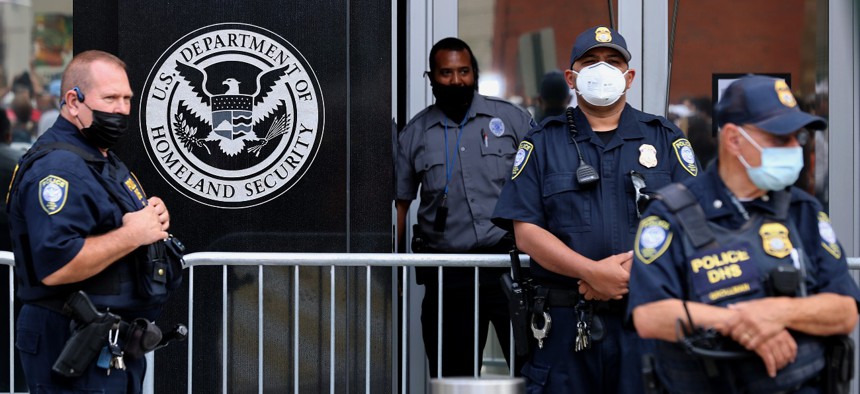
Homeland Security Police keep watch during a rally outside of the Immigration and Customs Enforcement headquarters in September 2021. As of February 2022, 27% of the FLETC’s overall workforce identified as women. Chip Somodevilla/Getty Images
The Federal Law Enforcement Training Center Wants to Know Why It Isn’t Able To Attract More Female Instructors
The training facility seeks to “create a more diverse and balanced law enforcement instructor workforce.”
The training center for federal law enforcement officers want to know what barriers women face in becoming instructors there.
Federal Law Enforcement Training Centers, housed within the Homeland Security Department, train law enforcement officers from over 100 federal agencies, as well as many state and local organizations. FLETC issued a request for information on Sunday looking for input from interested firms and organizations on a prospective barrier analysis, which centers on the GS-1801-12/13 Law Enforcement Specialist (Instructor) job series.
“Women are underrepresented in FLETC law enforcement instructor positions compared to males. In FY 2021 alone, FLETC received thousands of applications for instructor positions,” according to the request. “In a sample of approximately 188,136 applications for instructor positions, only 9% identified themselves as females, whereas 91% identified themselves as males.” As of February 2022, 27% of FLETC’s overall workforce identified as women.
The barrier analysis is “essential” for FLETC to meet the requirements of President Biden’s executive order on increasing diversity, equity, inclusion and accessibility in the federal workforce and specifically “create a more diverse and balanced law enforcement instructor workforce and reflect the growing presence of female law enforcement officers and agents in the federal workforce.”
It also fits into DHS’s “30x23 Women in Law Enforcement” initiative that was launched in December 2021 with the goal of increasing the number of female new hires for law enforcement positions by 30% by 2023, the notice stated.
The request for information seeks to understand what firms and organizations are capable of the barrier analysis FLETC is looking to do, which should include: a qualitative and quantitative analysis; an assessment of the FLETC workforce data and applicants, an “evaluation of representation discrepancies and underlying triggers/factors that account for lower rates in both hiring and retaining women” in this job series and recommendations on eliminating such barriers.
Responses are due by Aug. 1 and will be used for planning and information gathering purposes only.
The positions for instructors are located at all of FLETC’s training delivery points: Glynco, Georgia; Charleston, South Carolina; Cheltenham, Maryland; and Artesia, New Mexico.
FLETC is not alone among law enforcement agencies struggling to increase representation of women. In 2017, Politico reported that “federal law enforcement has a woman problem” and overall the law enforcement community has been majority male.







